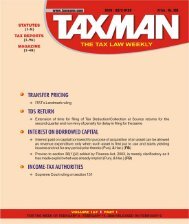news round up - Taxmann
news round up - Taxmann
news round up - Taxmann
- TAGS
- news
- round
- taxmann
- taxmann.com
You also want an ePaper? Increase the reach of your titles
YUMPU automatically turns print PDFs into web optimized ePapers that Google loves.
200 Goods & Services Tax Cases - Reports [Vol. 1<br />
11. In the case of Chowgule & Co. (P.) Ltd. (s<strong>up</strong>ra) the Apex Court has held<br />
as follows :<br />
“7. The revenue however relied on the decision of the Bombay High Court in<br />
Nilgiri Ceylon Tea S<strong>up</strong>plying Co. v. State of Bombay [1959] 10 STC 500 (Bom.).<br />
The assessees in this case were registered dealers in tea under the Bombay<br />
Sales Tax Act, 1953 and they purchased in bulk diverse brands of tea and<br />
without the application of any mechanical or chemical process, blended these<br />
brands of different qualities according to a certain formula evolved by them<br />
and sold the tea mixture in the market. The question arose before the Sales<br />
Tax Authorities whether the different brands of tea purchased and blended<br />
by the assessees for the purpose of producing the tea mixture could be said<br />
to have been ‘processed’ after the purchase within the meaning of the proviso<br />
to section 8(a), so as to preclude the assessee from being entitled to deduct<br />
from their turnover under section 8(a) the value of the tea purchased by them.<br />
The High Court of Bombay held that the different brands of tea purchased by<br />
the assessee could not be regarded as ‘processed’ within the meaning of the<br />
proviso to clause (a) of section 8, because there was “not even application of<br />
mechanical force so as to subject the commodity to a process, manufacture,<br />
development or preparation”, and the commodity remained in the same<br />
condition. The argument of the Revenue before us was that this decision of<br />
the Bombay High Court was on all fours with the present case and if the<br />
blending of different brands of tea for the purpose of producing a tea mixture<br />
in accordance with a formula evolved by the assessees could not be regarded<br />
as ‘processing’ of tea, equally on a parity of reasoning, blending of ore of<br />
different chemical and physical compositions could not be held to constitute<br />
‘processing’ of the ore. Now undoubtedly there is a close analogy between the<br />
facts of Nilgiri Tea Company’s case and the facts of the present case, but we<br />
do not think we can accept the decision of the Bombay High Court in the<br />
Nilgiri Tea Company’s case as laying down the correct law. When different<br />
brands of tea were mixed by the assessees in Nilgiri Tea Company’s case for<br />
the purpose of producing a tea mixture of a different kind and quality<br />
according to a formula evolved by them, there was plainly and indubitably<br />
processing of the different brands of tea, because these brands of tea<br />
experienced, as a result of mixing, qualitative change, in that the tea mixture<br />
which came into existence was of different quality and flavour than the<br />
different brands of tea which went into the mixture. There are, it is true, some<br />
observations in the judgment of the Bombay High Court which seem to<br />
suggest that if instead of manual application of energy in mixing the different<br />
brands of tea, there had been application of mechanical force in producing the<br />
tea mixture, the court might have come to a different conclusion and these<br />
observations were relied <strong>up</strong>on by the assessee, since in the present case the<br />
blending was done by application of mechanical force, but we do not think<br />
that that is the correct test to be applied for the purpose of determining<br />
whether there is ‘processing’. The question is not whether there is manual<br />
application of energy or there is application of mechanical force. Whatever be<br />
the means employed for the purpose of carrying out the operation, it is the<br />
effect of the operation on the commodity that is material for the purpose of<br />
determining whether the operation constitutes ‘processing’. We are clearly of<br />
the view that the blending of ore in the course of loading through the<br />
mechanical ore handling plant amounted to ‘processing’ of ore within the<br />
meaning of section 8(3)(b) and rule 13 and the mechanical ore handling plant<br />
GOODS & SERVICES TAX CASES ❑ JANUARY 20 - FEBRUARY 4, 2010 ◆ 76<br />
A<br />
B<br />
C<br />
D<br />
E<br />
F<br />
G











![“FORM NO. 3CEB [See rule 10E] Report from an ... - Taxmann](https://img.yumpu.com/45480232/1/190x245/form-no-3ceb-see-rule-10e-report-from-an-taxmann.jpg?quality=85)





